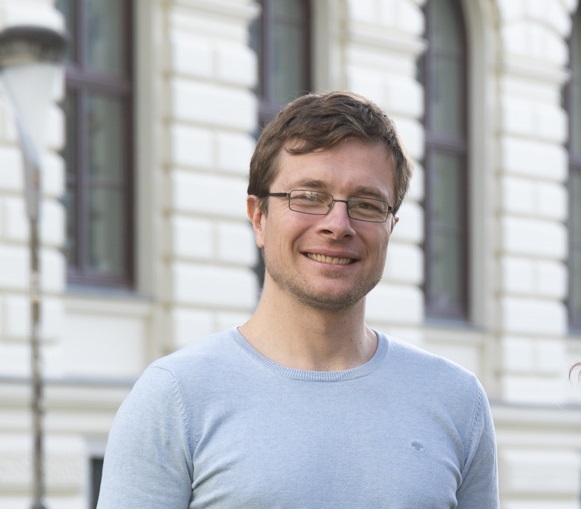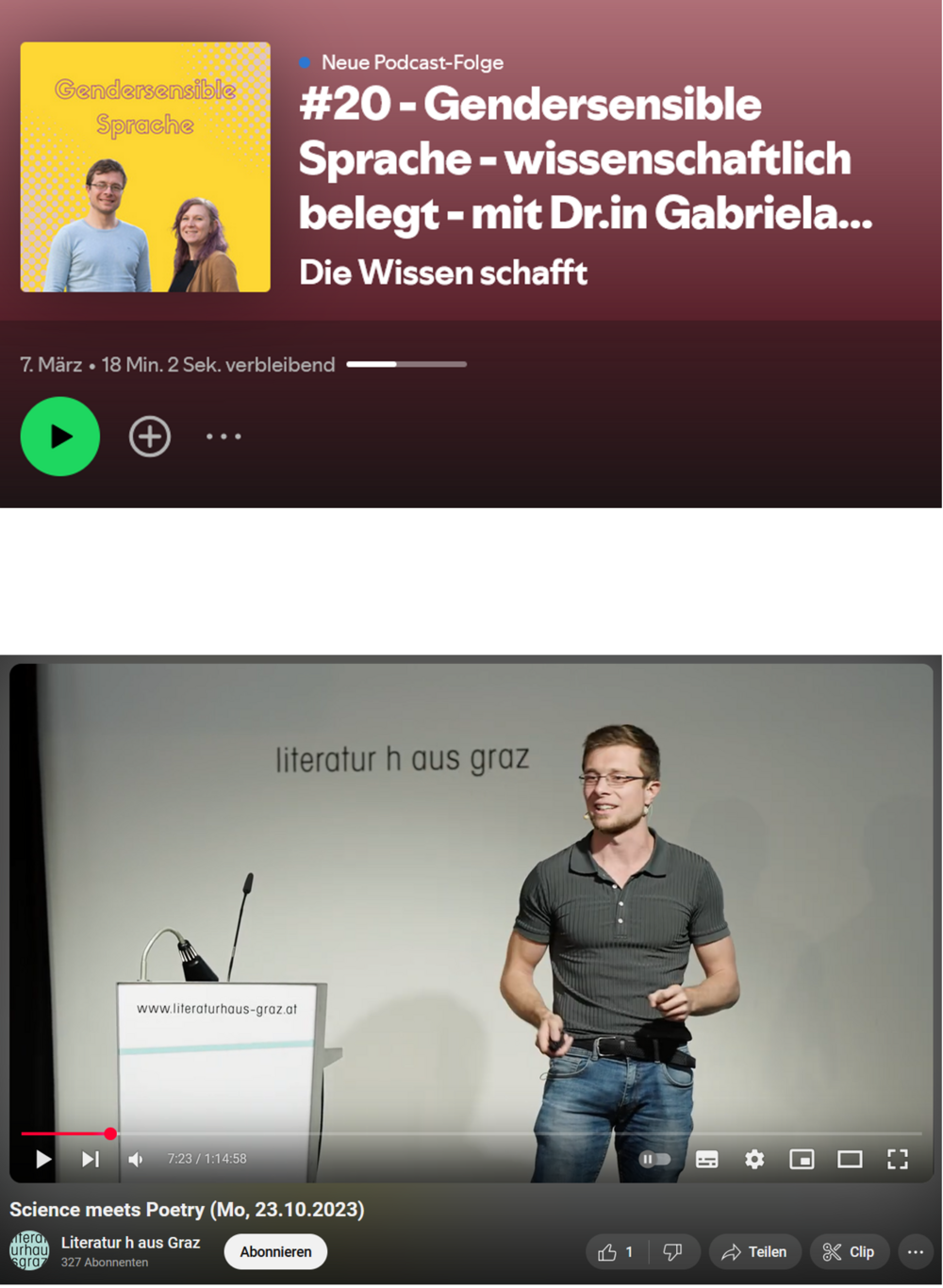Hilmar Brohmer
Research and Activities
After my Bachelor and Master studies in Social and Behavioral Sciences, I started working as a research associate at the University of Graz in 2016. I first completed my doctorate at the Department of Psychology in the Social Psychology Section under the supervision of Prof. Katja Corcoran. During this time, I conducted research on the cognitive effects of goal contagion. It was also during this period that, together with Gabriela Hofer and Tony Ross-Hellauer, I founded the Graz Open Science Initiative (GOSI).
Since completing my doctorate in 2020, I have been working on a broad range of topics, including environmentally friendly behavior, science communication (at times in collaboration with Hildrun Walter at the Seventh Faculty), gender-inclusive language, vaccine willingness, replication studies, and Open Science.
Methodologically, I have acquired various statistical skills since my PhD, including the application of complex moderation analyses with metric and categorical variables, structural equation modeling (from simple path models to models with lantent variables, among others), cluster analyses, supervised machine learning for exploratory analyses, meta-analyses with various bias corrections, and multilevel analyses.
In the field of Open Science—particularly transparent and reproducible research—I have developed expertise in the preregistration of studies and the use of repositories. I have shared this knowledge with colleagues and students in numerous workshops.

RESEARCH SHOWCASE
→ Open science and meta science
Replication studies in psychology demonstrate that the majority of published effects are not shown in repeated studies. Open science practices such as data sharing are generally intended to make research more replicable. However, only a minority of doctoral students use these practices.
Brohmer & Hoffmann, 2025, The Struggle to Make Transparency Mainstream, https://doi.org/10.1098/rsos.250826, [DATA] [PREREG]
Brohmer, Hofer & von Götz, 2025, The State of Study Preregistration, https://doi.org/10.5281/zenodo.17601412
Röseler et al, 2024, The Replication Database, https://doi.org/10.5334/jopd.101
→ Public trust in science
Trust in science is generally high in the population, but does not extend across all social groups. Can communicating open science practices lead to a further strengthening of trust? In an Austria-wide survey, my team was able to show that scientists are trusted more when they share their data (and do not keep it secret).
Brohmer et al, 2024, Facets of Trust in Science, https://doi.org/10.15626/MP.2024.4230 [DATA][PREREG]
Hofer et al, 2023, SIPS Conference
→ Multi-lab replication studies
Multi-lab studies are useful because a study is not only conducted once, but several times at the same time. In such a replication study, my team was able to show, for example, that people name celebrity women more frequently when they were asked to do so using a gender-equitable formulation (e.g. "Name female politicians").
Brohmer, Hofer et al, 2024, Effects of the Generic Masculine, https://doi.org/10.5334/irsp.522 [DATA][PREREG]
Vaidis et al, 2024, Cognitive Dissonance, https://doi.org/10.1177/25152459231213375[DATA][PREREG]


→ Environmental behaviour and energy saving
Which psychological factors influence environmental behaviour? In my research, I was able to show that future orientation in planning, behavioural control and willingness to make sacrifices - but less so general environmental values - are associated with positive energy behaviour.
Brohmer et al, 2023, Predictors of Pro-Environmental Behaviour, https://doi.org/10.1007/s12053-023-10157-x [DATA][PREREG]
Thaller et al, 2023, Low-carbon mobility, https://doi.org/10.1371/journal.pclm.0000157[DATA][PREREG]
→ Conjoint studies for smart technology
Conjoint studies are used to identify preferences for products or services. In such studies on "living labs" or "energy communities", we were able to identify various preference markers.
Brohmer et al, 2023, Living Labs, https://doi.org/10.1007/s43621-023-00138-6 [DATA][PREREG]
Brohmer et al, 2025, Energy Communities [COMING SOON]
→ No inspiration through "goal contagion"
How do people get inspired by other people - for example to engage in pro-social or environmental behaviour? Simply observing behaviour is obviously not enough, as I was able to show in the research for my dissertation. In addition, effects in the literature appear to be highly distorted.
Brohmer et al, 2021, Meta Analysis, https://doi.org/10.5334/irsp.428a [DATA][PREREG]
Corcoran et al, 2020, Registered Report, https://doi.org/10.1080/23743603.2020.1767502 [DATA][PREREG]
WORKSHOPS, TALKS AND TEACHING
WORKSHOPS, TALKS AND TEACHING
Over the past few years, I have held various courses and workshops. I also started a YouTube channel on the statistics program Jamovi during the Covid lockdowns.
- Data stewardship course units on open science (preregistration, open data, etc.). ); University of Graz, summer semester 2024, summer semester 2025
- Workshop: Open Science and using the OSF repository; Fernuniversitaet Porsche, Psychology, October 2024
- Workshop: Open Science and using the OSF repository; University of Klagenfurt, Psychology, December 2023
- Lecture and exercise Introduction to Statistics; FH Joanneum Bad Gleichenberg, Bachelor Nutritional Sciences, winter semester 2023/24
- Compulsory elective course Open Science (together with Katja Corcoran); Master Psychology, University of Graz, winter semester 2020/21, summer semester 2021
- Compulsory elective course Inter- and Intrapersonal Processes: Evolutionary Psychology; Bachelor Psychology, University of Graz, winter semester 2021/22
- Elective course Inter- and Intrapersonal Processes: Social Cognition; Bachelor Psychology, University of Graz, winter semester 2020/21, summer semester 2021
- Compulsory elective course Application of Statistical Methods (in R, Jamovi, and SPSS), Bachelor Psychology, University of Graz, summer semester 2017, 2019, 2020, 2021
I also supvervised (or co-supvervised) several Master theses. Here a selection:
- Possnigg, A. (begonnen). Trust in Science
- Gehm, F. (begonnen). Concepts of Trust in Science
- Koglek, J. (2025). Fungiert negativer Affekt als treibende Kraft der Reduktion kognitiver Dissonanz? UB Graz, https://resolver.obvsg.at/urn:nbn:at:at-ubg:1-217888
- Hoffmann, F. (2024). Adopting openness : a comparative study of open science practices in dissertations across psychology departments. UB Graz, https://resolver.obvsg.at/urn:nbn:at:at-ubg:1-211475
- Zawischa, D. (2024). Von Werten geleitet, von Informationen gestaltet : Analyse der Zusammenhänge von Informationsverarbeitung und Werteorientierung auf aktive und nachhaltige Energieverbrauchspraktiken. UB Graz, resolver.obvsg.at/urn:nbn:at:at-ubg:1-207761 (main supervision: U. Athenstaedt)
- Gundolf, I. (2022). The interplay of biospheric values and information processing on pro-environmental behavior. UB Graz, resolver.obvsg.at/urn:nbn:at:at-ubg:1-180483 (main supervision: U. Athenstaedt)
- Dentler, E. (2021). Dating game, Dating Pain: How the Status of a Competitor influences Envy in a Dating Game. UB Graz, resolver.obvsg.at/urn:nbn:at:at-ubg:1-172405 (main supervision: K. Corcoran)
SCIENCE COMMUNICATION
March 2025, Podcast:
Die Wissen schafft: Gender-sensitive language - scientifically proven
Gaby Hofer and I chatted to science communicator Charlotte Zajc about our study on gender-sensitive language. You can listen to the podcast episode here: http://bit.ly/43rFYWs
October 2023, public talk:
"Literature H from Graz": Science meets Poetry
I was a guest at Science meets Poetry to talk about the topic of "comprehensibility". I took a humorous approach to this and interpreted it from the perspective of science - which itself does not always communicate in an understandable way. You can watch the lecture here: https://www.youtube.com/watch?v=5ozfGFo8hbU#t=4m47s
August 2021, multi-lab Covid study:
Press release from the University of Graz
During the corona pandemic, Gaby Hofer and I were involved in a worldwide multi-lab study in which we were interested in the psychological effects of this period. The press release is available here: https://www.uni-graz.at/de/neuigkeiten/anders-denken/
June 2020, public talk
Defence of the dissertation
On 19 June 2020, I defended my dissertation at the University of Graz. The examination board consisted of Katja Corcoran, Malte Friese, and Ursula Athenstaedt (chair). Here is the video: https://www.youtube.com/watch?v=r2G2g3h61bI
